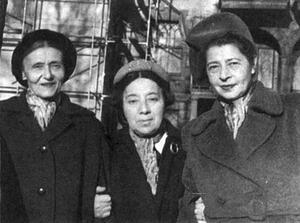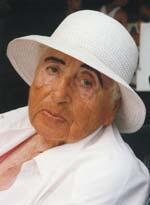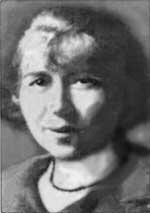Rajzel Zychlinski
Praised as one of the most original voices in modern Yiddish poetry, Rajzel Zychlinski used free verse and sparse language to capture the devastation of the Holocaust. Raised by her mother, Zychlinski published her first poems in the Yiddish newspaper Folksaytung in 1928. In the 1930s she worked in an orphanage, then moved to Warsaw, where she worked in a bank and published her first two collections. She married Isaac Kanter in 1941 and spent the war hiding from the Nazis in Russia. She immigrated to New York in 1951 and studied at City College and the New School. She went on to publish four more books and was honored in 1975 with the Itzik Manger Prize, Israel’s highest award for Yiddish literature.
Rajzel Zychlinski’s poetry was shaped by the hopes and horrors of the twentieth century. She lived in Poland, the Soviet Union, France and the United States and was fluent in five languages, but for over seventy years she wrote only in the one idiom that was truly hers: Yiddish.
Early Life
Rajzel Zychlinski was born on July 27, 1910, in the town of Gabin (Gombin, 74 km north-northeast of Łódź), Poland, at that time under Russian occupation. Her father, Mordechai Zychlinski, was a tanner. He emigrated to the United States three times, taking with him two older daughters, probably from an earlier marriage. In 1928 he died in Chicago. During her husband’s emigration attempts, Rajzel Zychlinski’s mother Dvoyre (Deborah) remained in Poland with her five children: two daughters, Chane (Hannah) and Rajzel (Rose), and three sons, Yankev (Jacob), Dovid (David), and Avrom (Abraham). Initially the mother herself ran the family-owned tannery; later the oldest son took over. Dvoyre Zychlinski came from a respected religious family from which, for generations, rabbis had stemmed. Fearing for her religious beliefs, Zychlinski’s pious mother did not want to follow her husband to America until he could provide enough income to ensure that none of the children would have to work on the SabbathSabbath. Rajzel Zychlinski attended a Polish public school from 1916 to 1923. After this, she was educated by private teachers, since there was no higher school for girls in Gabin.
Poetic Debut
Zychlinski made her poetic debut in 1928, the year of her father’s death, when she was eighteen. Her first poems were published in the Warsaw-based Yiddish daily Folkstsaytung. She soon became known as one of modern Yiddish poetry’s most original voices. In the early 1930s, Zychlinski moved to Włocławek, where she worked in an orphanage. In 1936, when her first book, Poems, was published by the Yiddish P.E.N. Club, she lived in Warsaw where she worked at a bank. Among her early mentors were the writer and journalist Melekh Ravitch (1893–1976), who was the literary editor of the Folkstsaytung, and the poet Itzik Manger (1901–1969). Manger pointed out the few poetic images that dominated Zychlinski’s poems: the mother, the cat, the willow, the cloud, the poplar tree, the beggar, the child, and the well. He warned her not to become “a prisoner of her mother’s Parnassus.” Because of her sparse use of language, Manger compared Zychlinski’s poems to Japanese tankas.
Surviving the Holocaust
In 1937, Zychlinski won the Reuben Ludwig Award of the modernist Yiddish-American literary publication Inzikh. Like her American counterparts, Zychlinski preferred free verse, without completely rejecting rhyme. Her second book, The Rain Sings, was published in 1939, shortly before the outbreak of World War II. Few copies remain; the books were destroyed as its readers were murdered and their home towns devastated.
Rajzel Zychlinski survived the bombardment of Warsaw and the fall of the city. After witnessing the first atrocities committed by Germans against Jews, she decided to flee occupied Poland. By night she crossed the river Bug, which had become the border to the Soviet Union after the Soviets annexed the eastern part of Poland. She first lived in Lvov (L’viv) and later in Kolomyya with the parents of her husband-to-be, Isaac Kanter. Born in 1908, Isaac Kanter was a well-read psychiatrist who also wrote; he knew Zychlinski from Warsaw. The couple married in January 1941. Soon afterwards, when the German invasion of the Soviet Union began, they had to flee further eastward. They survived the war close to Kazan, where on February 15, 1943, their only son Marek (Kanter) was born.
On their return to Poland in 1946, the family was first interned in a camp for Jewish survivors and DPs in Lower Silesia. It was then that what she had already heard and feared was confirmed: Her family had perished during the Holocaust. In September 1939 the Germans had burned Gabin’s famous wooden synagogue, erected in 1710, and early in 1940 set up a ghetto. On May 12, 1942, the ghetto was liquidated, its inhabitants murdered in the gas vans of the Chełmno extermination camp.
Zychlinski and her husband could no longer live in Poland, where antisemitism had not ended with the war. There everything reminded them painfully of their lost relatives and friends and of a world that no longer existed. Before their departure for Paris in 1948, Rajzel Zychlinski’s third book came out in Łódź. Entitled To Bright Shores, it was dedicated “to the holy memory of my mother Dvoyre, my sister Chane, my brothers Yankev and Dovid, and their children, my mother’s grandchildren—victims of Chełmno and Treblinka.”
From Paris to New York
For the next three years the family lived in Paris. Since Isaac Kanter could not obtain a work permit, they emigrated to America in 1951. The Yiddish literati of New York welcomed Rajzel Zychlinski warmly. While her husband studied once again to get the necessary papers to work as a psychiatrist, the poet took on her own education. First she obtained a high-school diploma; afterwards she attended New York’s City College for two years, studying biology and English literature. After graduating she attended the New School, where she took classes in literature and philosophy. Though she did not finish with a degree, she insisted that this was the happiest time of her life.
There were also difficulties, which are evident in the poems she continued to write. She and her husband separated during the 1950s. Marek was raised by his father, while Zychlinski moved from Manhattan to Brooklyn. Over the years she became more and more restless and at the same time reclusive. Rajzel Zychlinski was excessively reluctant to talk about autobiographical facts. She always referred to her poetry, saying that everything of importance would be in it.
Later Life and Legacy
Zychlinski published four more books between 1953 and 1993. In them, she often mourns the dead and the destruction of the vibrant Jewish life of Eastern Europe. She longs for her lost family and murdered friends. The provocativeness of some of her early poetry, where she turned biblical stories and motives upside down, was replaced by an often solemn lyrical tone. A master of the short form and free verse, she is undoubtedly among the most original writers of modern Yiddish poetry. In 1975 she received the Itzik Manger-Prize, Israel’s most prestigious award for Yiddish literature.
In 1997, the elderly and increasingly frail poet moved from Brooklyn to California to be close to her son Marek. Rajzel Zychlinski died on June 13, 2001, in Concord, California. On July 27, her ninety-first birthday, her ashes were, according to her wishes, committed to the sea.
Selected Works
Poems (Lider, Yiddish). Warsaw: Pen-bikher, 1936.
The Rain Sings (Der Regn zingt, Yiddish). Warsaw: 1939.
To Bright Shores (Tsu Loytere Bregn, Yiddish). Łódź: Yidish-bukh, 1948.
Silent Doors (Shvaygndike Tirn, Yiddish). New York: P.E.N. Club, 1962.
Autumn Squares. Poems (Harbstike Skvern. Lider, Yiddish). New York: 1969.
The November Sun. Poems and Stories (Di November-Zun. Lider un Dertseylungen, Yiddish). New York: Zychlinska, 1977.
New Poems (Naye Lider, Yiddish). Tel Aviv: 1993.
Translations:
Vogelbrot (German). Translated and edited by Hubert Witt. Leipzig: Insel-Verlag, 1981.
Gottes blinde Augen (Yiddish and German). Edited and translated by Karina Kranhold. Berlin: Oberbaum, 1996.
God Hid His Face. Selected Poems. Translated from the Yiddish by Barnett Zumoff, Aaron Kramer, Marek Kanter, and others. With an Introductory Essay by Emanuel S. Goldsmith. Santa Rosa, CA: Word & Quill Press, 1997.
Di lider 1928–1991. Die Gedichte. Jiddisch und Deutsch (Yiddish transcription and German). Translated and edited by Hubert Witt. Frankfurt a.M.: Zweitausendeins, 2002.
Basman, Rivke. “With Rajzel Zychlinski’s World’s” (Yiddish). Di Goldene Keyt 138 (1994): 214–215.
Bikl, Shloyme. “Rajzel Zychlinski.” Writers of My Time. (Shrayber fun mayn Dor, Yiddish). New York: Matones, 1958, 133–139.
Glatshteyn, Yankev. “Rajzel Zychlinski.” Most Importantly. (In Toch Genummen, Yiddish). New York: Farlag fun Idish natsionaln arbeṭer farband, 1956, 335–341.
The Itsik Manger Prize for Yiddish Literature. Seventh Award Ceremony (Itsik-Manger-Prayz far Literatur-Shafung in Yidish. 7. Fartaylung, Yiddish). Edited by Eliezer Rubinshteyn. Tel Aviv: 1975.
Kranhold, Karina: “… und ich bin am Leben geblieben: Eine Begegnung mit der jiddischen Dichterin Rajzel Zychlinski.” (German). Akzente LXIII (1996; 3): 204–209.
Niger, Samuel. “Rajzel Zychlinski: On Her Arrival in America.” Der Tog, July 1, 1951; July 1, 1951.
Olitski, Mates. “The Poet Rajzel Zychlinski” (Yiddish). Poem and Essay. (Lid un Esay, Yiddish). Tel Aviv: Yisrael Buch, 1988, 105–110.
Rawitsch, Melekh. “Rajzel Zychlinski.” My Encyclopedia. (Mayn Leksikon, Yiddish). Montreal: 1945, Aroysgegebn fun a komitet, 99–100.
Shnaper, Ber. “Di Lider fun Rajzel Zychlinski” (Rajzel Zychlinski’s Poems). Literarishe Bleter. Warsaw: July 24, 1936.
Shulman, Abraham. “Rajzel Zychlinski.” Gombin: Dos Lebn un Umkum fun a Yidish Shtetl in Poyln, Yiddish (Gabin: Life and Destruction of a Yiddish Shtetl in Poland). Edited by the Gombiner Landsmanshaft in America, 167–169. New York: Aroysgegebn fun der Gombiner landsmanshaft in Amerike, 1969.
Von Tippelskirch, Karina. “Also das Alphabet vergessen? Die jiddische Dichterin Rajzel Zychlinski.” Ph.D. diss., Marburg: 2000.
Von Tippelskirch, Karina. “Rajzel Zychlinsky: Writing in her Mother’s Tongue.” Prism. An Interdisciplinary Journal for Holocaust Educators. Vol. 8 (2016): 58–62.
Witt, Hubert. Nachwort (German). Rajzel Zychlinski. Die Gedichte. Jiddisch und Deutsch. Frankfurt a.M.: Zweitausendeins, 2002: 892–918.





